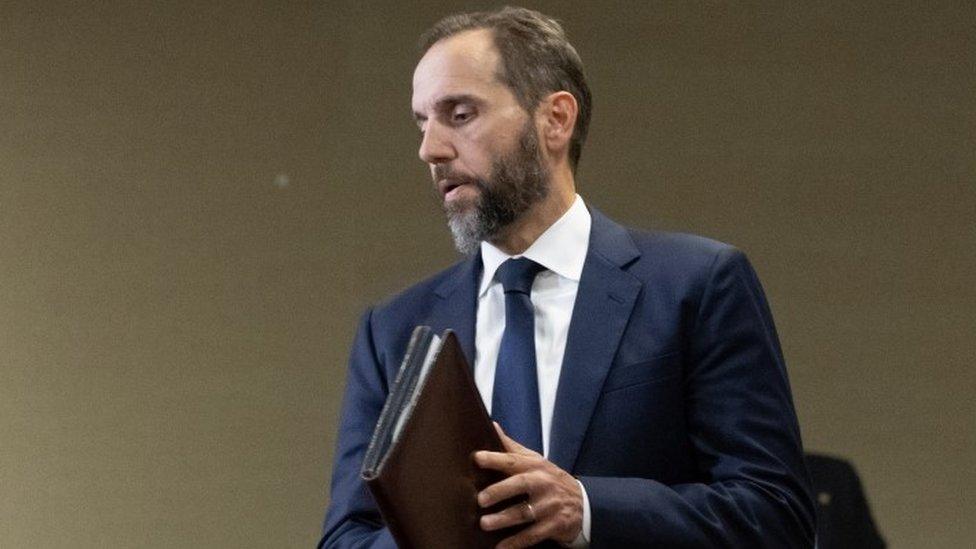Five takeaways from Trump's indictment for 2020 election interference
- Published
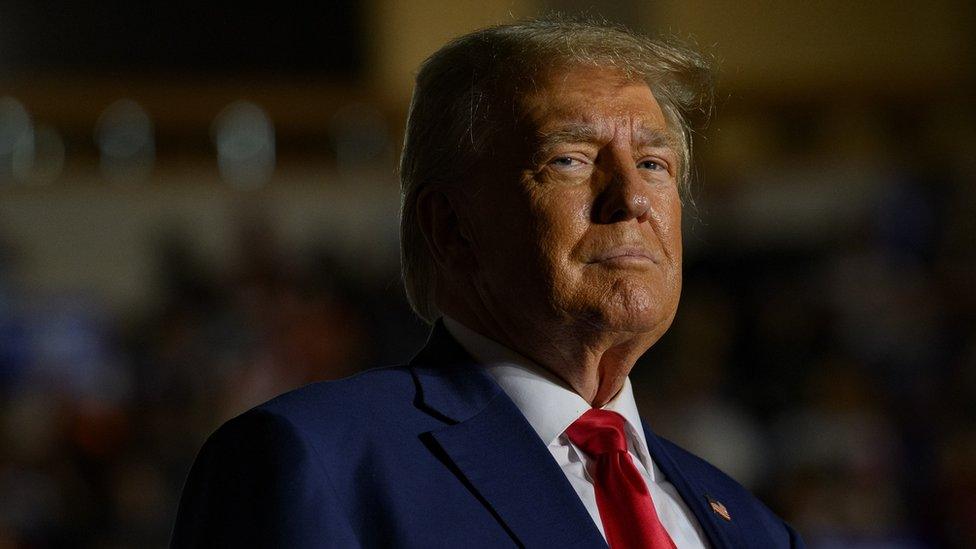
The special counsel investigating Donald Trump's efforts to overturn the 2020 election results has issued four charges against the US former president.
The 45-page indictment alleges Mr Trump orchestrated a broad conspiracy designed to keep him in power after he was defeated by President Joe Biden.
It accused him of knowingly spreading "pervasive and destablising lies" about election fraud that threatened the presidential election and therefore American democracy.
Mr Trump described the charges - the third separate criminal indictment he is facing - as part of "un-American witch hunts" against him.
The four charges are conspiracy to defraud the United States, conspiracy to obstruct an official proceeding, obstruction of an official proceeding, and conspiracy against rights.
Some legal experts say it will be a challenge to prove that Mr Trump's actions amount to crimes, and that a potential defence could be that what he said and did was protected by the US Constitutional First Amendment right to free speech.
Here are five key takeaways from the Justice Department's case.
1. Trump is accused of a wide-ranging conspiracy
In the indictment, special counsel Jack Smith does not focus on one particular incident, such as the January 6, 2021, attack on the US Capitol by Mr Trump's supporters. Instead he considers the entirety of Mr Trump's actions over a two-month period from just after election day to the day he left the White House.
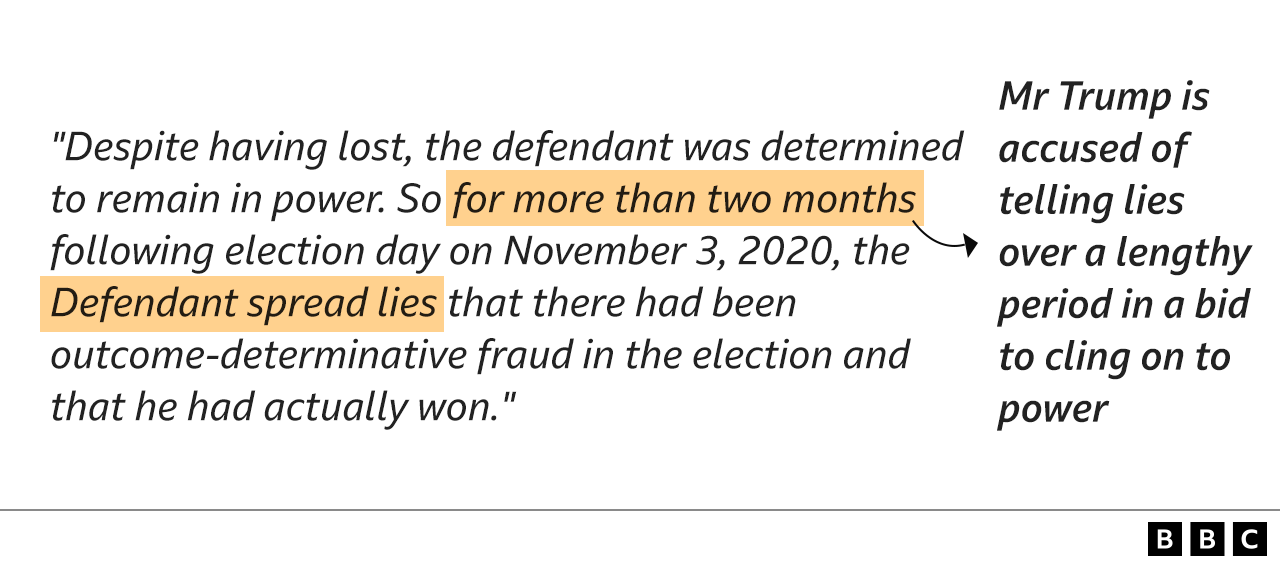
Prosecutors go on to outline a three-part criminal conspiracy that violated various elements of Section 18 of the US Code:
A conspiracy to defraud the US by using fraud and deceit to impair, obstruct and defeat how the government collects, counts and certifies the results of presidential elections
A conspiracy to corruptly obstruct and impede the certification of the electoral college results by Congress on 6 January
A conspiracy against the right to vote and to have one's vote counted, which comes under the conspiracy against rights statute
That last charge brings home the alleged harm Mr Trump directly caused to voters, said Daniel Charles Richman, a professor at Columbia University Law School.
He is accused of harm not just to the government and to Congress, but also "to the citizens whose right to have their votes mean something Trump allegedly tried to take away", Mr Richman told the BBC.
2. Trump allegedly had six co-conspirators
The indictment mentions six people who allegedly helped Mr Trump carry out his unlawful efforts to overturn the election results, by pushing officials to ignore the popular vote, to disenfranchise millions of voters and replace legitimate electors with fake ones.
The document does not name them, but five are identifiable as details about their alleged behaviour in the indictment track closely to material about named individuals that was already in the public domain.
Co-conspirator 1, described as "an attorney who was willing to spread knowingly false claims and pursue strategies that the Defendant's 2020 re-election campaign would not", appears to be Rudy Guiliani, his lawyer said in a statement.
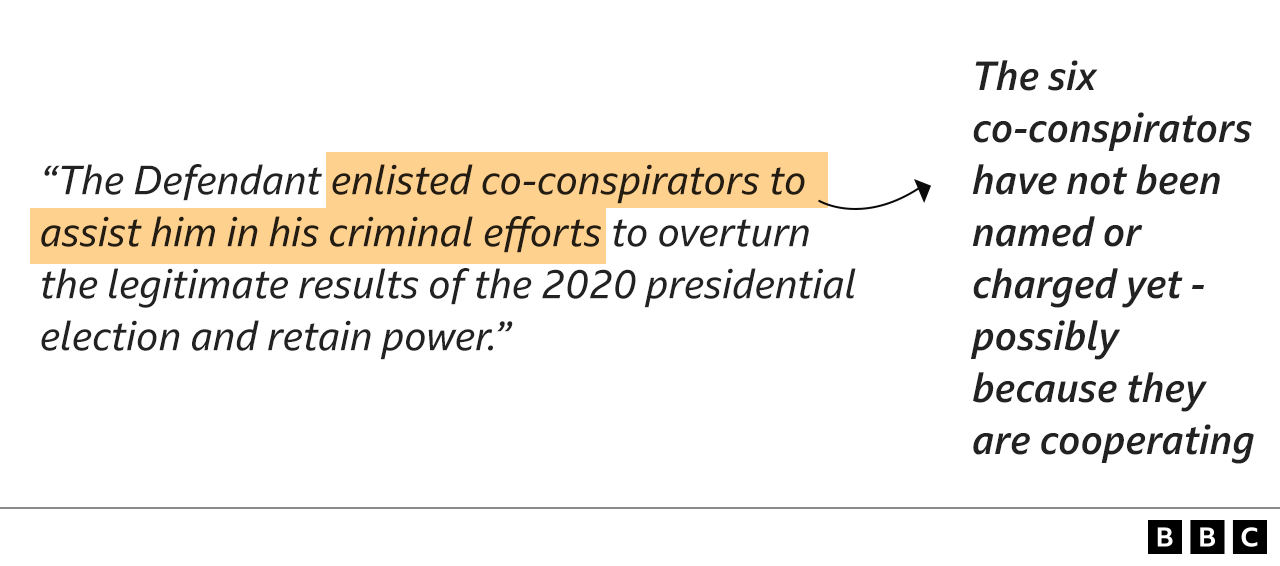
The details for co-conspirator 2 match what is known about lawyer John Eastman. His lawyer Charles Burnham said in a statement that the indictment used a "misleading presentation of the record to contrive criminal charges against Presidential candidate Trump and to cast ominous aspersions on his close advisors".
Co-conspirators 3, 4 and 5 are reported in US media as being former Trump lawyer Sidney Powell, former Justice Department official Jeffrey Clark and lawyer Kenneth Chesebro, but so far none of them has made any comments.
Watch: Special counsel Jack Smith describes as "assault on democracy"
The sixth co-conspirator, described in the indictment as a political consultant, has not been identified.
Prosecutors included these individuals to back up their conspiracy charges against Trump, Aziz Huq of the University of Chicago Law School, explained. Basically, you can't have a conspiracy with just one person - you have to conspire with others.
However, the six have not been charged in this indictment - and there is no guarantee all will be. There could be many possible reasons prosecutors decided not to name the co-conspirators here, Mr Huq said. For one, these individuals could be co-operating with investigators.
3. Mike Pence was taking notes, lots of them
The indictment mentions the former vice-president more than 100 times and provides fresh details on conversations the two men had - largely thanks to copious notes Mr Pence was taking of their interactions. The document refers to his notes several times.
One Christmas Day exchange stands out.
"On December 25, when the the Vice President called the Defendant to wish him a Merry Christmas, the Defendant quickly turned the conversation to January 6 and his request that the Vice-President reject electoral votes that day," the indictment reads.
"The Vice-President pushed back, telling the Defendant, as the Vice President already had in previous conversations, 'You know, I don't think I have the authority to change the outcome."
After another similar conversation a week later, Trump told him, according to the indictment: "You're too honest."
Since leaving office in 2021, the former vice-president has been largely defined by the role he played in those days, leading up to the US Capitol attack.
His resistance to Mr Trump's pressure to reject the true electoral votes - defying his former boss - put him in danger as a mob shouting his name went on the rampage in the corridors of Congress.
It has also alienated him with the former president and with large sections of Trump supporters, complicating his own run for the Republican nomination.
4. Trump knowingly repeated false claims of election fraud
The indictment does not just allege Trump made false claims - it says that he knew that what he was saying about the election results wasn't true.
"The Defendant repeated and widely disseminated them anyway - to make his knowingly false claims appear legitimate, create an intense national atmosphere of mistrust and anger, and erode public faith in the administration of the election."
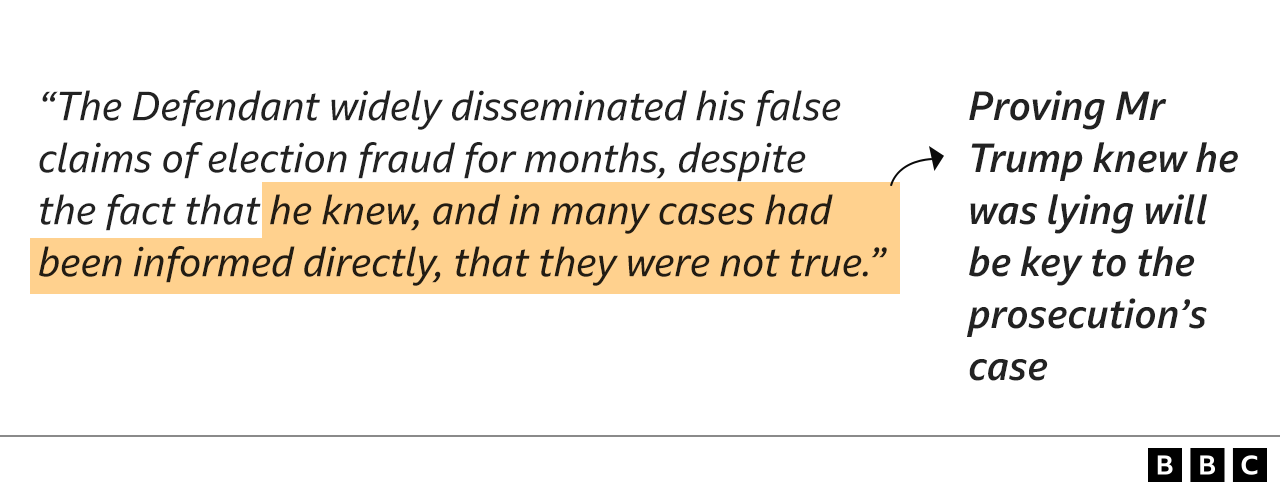
Government prosecutors say this is an important element to his conspiracy to stay in power.
The indictment also says Trump lied and echoed false claims of election fraud for months, despite repeatedly being told they weren't true by multiple people in his circle, those "whom he relied" on for "candid advice". That list includes:
Vice-President Mike Pence, who told Mr Trump he had seen no evidence voter fraud which would have altered the outcome of the election
Senior White House attorneys appointed by Trump, who told him "that his presidency would end on Inauguration Day in 2021"
Senior leaders of the Justice Department appointed by Trump, who told him on "multiple occasions" that his fraud allegations were unsupported
The indictment points to an occasion on 31 December, 2020, when Mr Trump, having been told again his claims were unfounded, allegedly "suggested he might change the leadership in the Justice Department".
Establishing that Mr Trump knew he was lying will be crucial to proving his intent to commit a crime.
5. Trump may have a free speech defence
Jack Smith acknowledges in the indictment that Mr Trump, like any American, had a right to challenge the results of the election, and even to falsely claim that he only lost because of supposed voter fraud.
That First Amendment constitutional right to express his views may be one hurdle the prosecution has to overcome in this case.
Jonathan Turley, a prominent conservative legal scholar, who described Mr Trump's previous indictment related to classified documents as strong, tweeted that the special counsel Jack Smith had "just issued the first criminal indictment of alleged disinformation"., external
"Some of the speech might be protected by the First Amendment," said Mr Huq of the University of Chicago Law School. But, he added: "Speech that is used to facilitate the crime is almost never covered by the First Amendment."
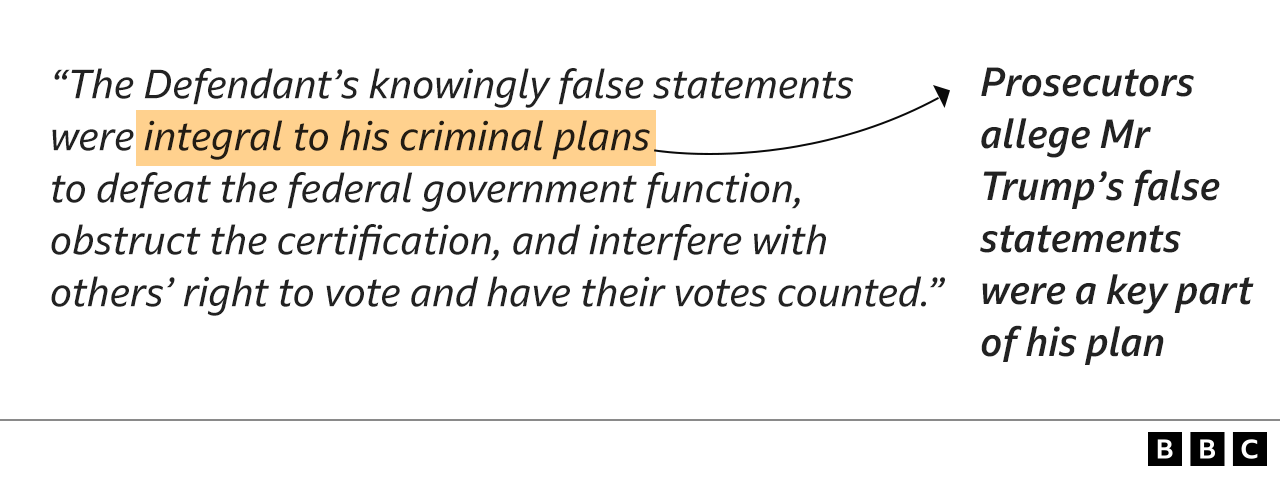
That might be a reason why the special counsel tries to stress that what Mr Trump said and did was a key component of his conspiracy to overturn the election result.
"The defendant's knowingly false statements were integral to his criminal plans to defeat the federal government function, obstruct the certification, and interfere with others' right to vote and have their votes counted," states one key passage.

What questions do you have about the charges? Email: haveyoursay@bbc.co.uk, external.
Please include a contact number if you are willing to speak to a BBC journalist. You can also get in touch in the following ways:
WhatsApp: +44 7756 165803
Tweet: @BBC_HaveYourSay, external
Please read our terms & conditions and privacy policy
If you are reading this page and can't see the form you will need to visit the mobile version of the BBC website to submit your question or comment or you can email us at HaveYourSay@bbc.co.uk, external. Please include your name, age and location with any submission.
Related topics
- Published2 August 2023
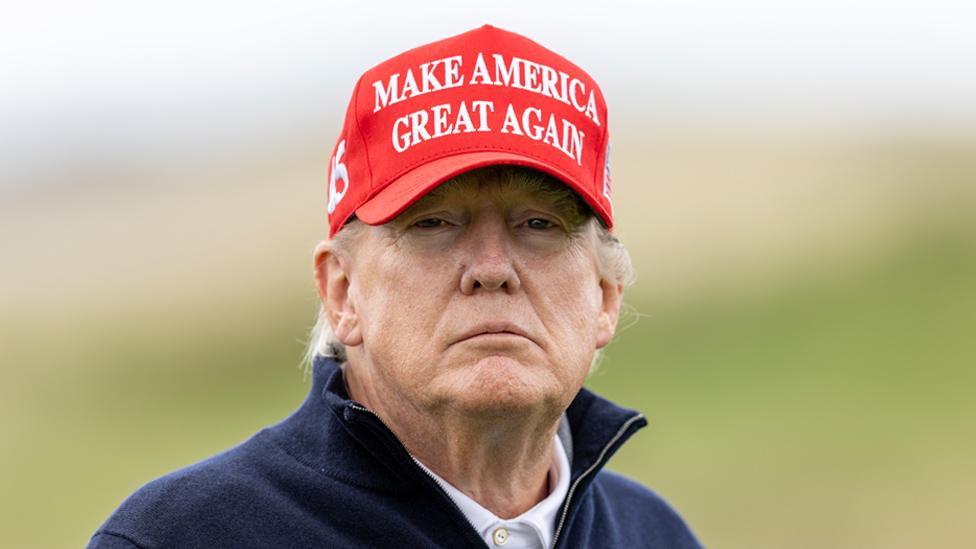
- Published28 August 2024
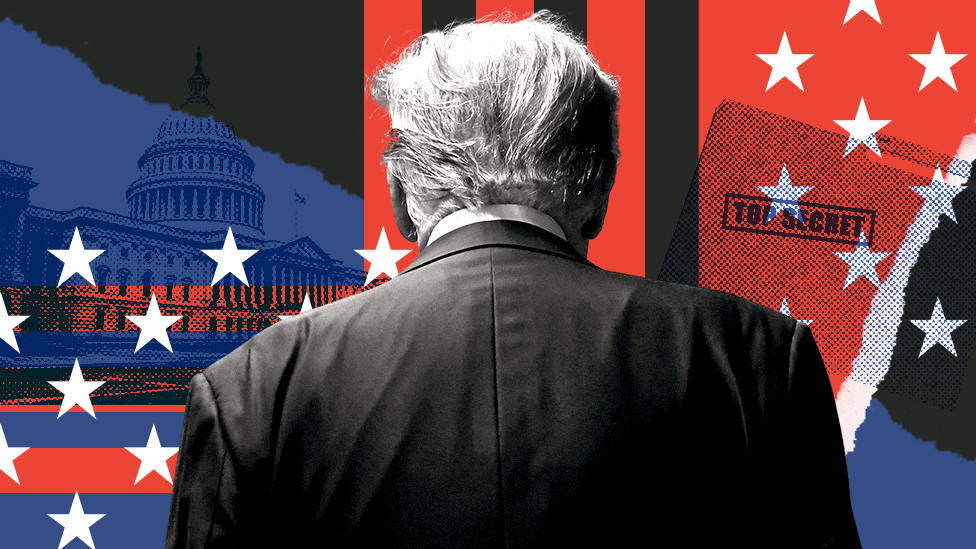
- Published2 August 2023
- Published28 July 2023
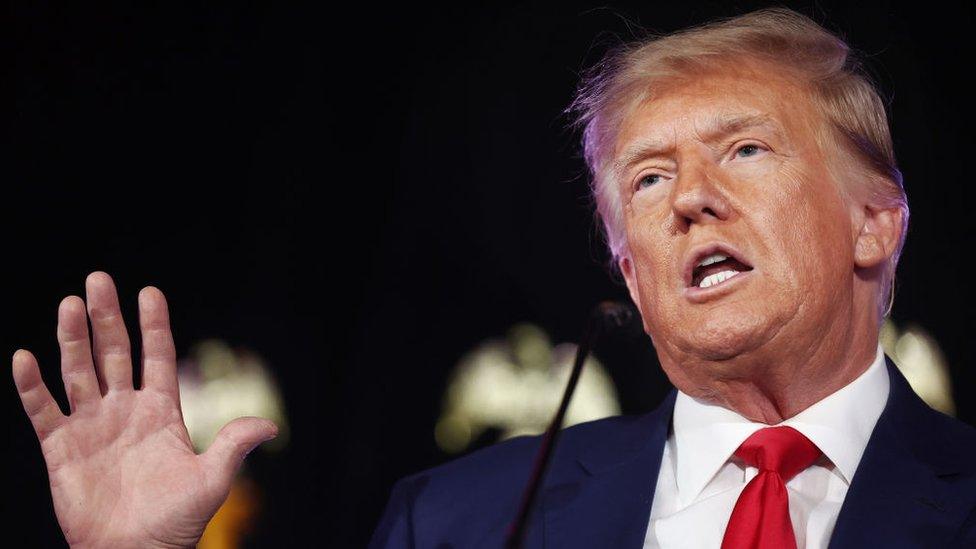
- Published15 July 2024
